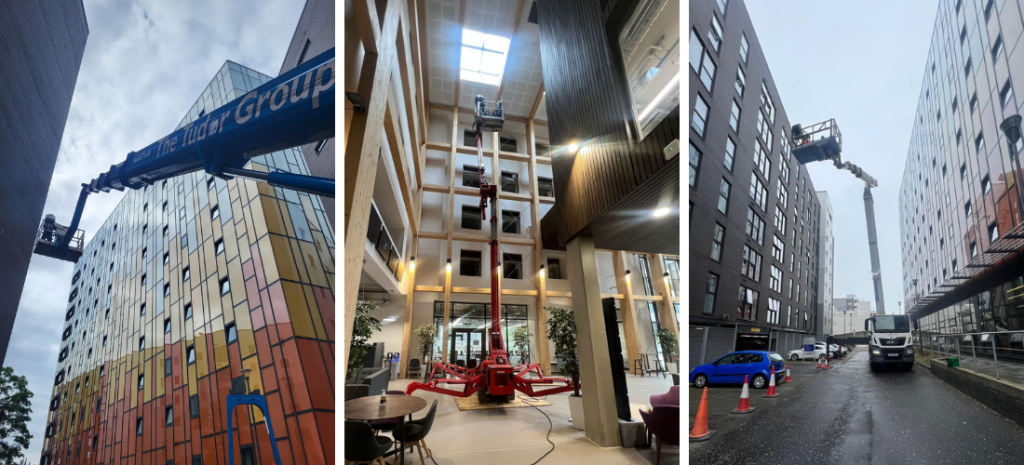Perched precariously on the edge of a towering building, armed with nothing more than a squeegee and courage – this was the perilous reality of a window cleaner not too long ago, a profession then tinged with danger and the ever-present risk of the unthinkable.
Not for the faint-hearted
It wasn’t uncommon to see these brave people standing on high tenement window ledges cleaning and sometimes even having their lunch sitting on the ledge to save time. That’s a scene almost unimaginable today, considering the stringent health and safety measures that are essential to the trade.
It was a lack of these robust health and safety regulations in the past that meant the many risks associated with window cleaning were simply accepted as part and parcel of the job. Unfortunately, this attitude resulted in numerous accidents, some with devastating outcomes.
Safety gear was rudimentary at best, with harnesses and fall arrest equipment being more of an exception than a norm. Little thought was given then to factors such as weather conditions, and cleaners often worked in less than favourable elements, further heightening the risk involved.
Redefining window cleaning standards
Fast forward to today, and the landscape has dramatically changed.
At The Tudor Group, our window cleaning operations have an innovative, safety-focused approach, leveraging a host of modern techniques to ensure the quality of our work and the well-being of our team. These strategies have been crafted to cater specifically to each unique task, embracing the diversity of structures and buildings we service.

Jamie Farrell, Window Cleaning Manager, takes us through the various techniques that have been used: “Among the most common techniques, we’ve seen the Bosun chair used in the past – an apparatus akin to a suspended seat. These chairs were initially used aboard ships, allowing sailors to reach otherwise inaccessible parts of the vessel.
“This strategy was then adapted for use in window cleaning. Workers used to sit in the Bosun chair and we’re not actually attached to anything. They would start from the top and work down the face of the building. A simple hitch knot was used to secure them in place. This technique offered unparalleled access for the time, allowing for a thorough and effective cleaning process
These days the cherry picker is an instrumental tool in our cleaning arsenal. A versatile hydraulic crane equipped with a platform, it grants us access to those high and hard-to-reach spots that were once the bane of window cleaners.
“A single operative can control the ascent, descent, and horizontal movement, all while enjoying the safety of a secure platform. My team is always mindful of the load-bearing capacity of the surfaces on which the cherry picker will be parked.
“We meticulously assess the ground conditions to ensure stability, avoiding any potential accidents.”
For the most part, you’ll see Jamie and his team using water-fed poles, which represent another leap in window cleaning evolution. These extendable poles, equipped with brush attachments and a water supply system, can extend to clean windows several storeys high.
A key element in this process is purified water, delivered directly through the pole, ensuring a great finish without the need for detergents or squeegees. The pole itself can be adjusted according to the height of the windows, negating the need for risky ladder ascents.
A clean act
Contemporary health and safety regulations in window cleaning are comprehensive, stringent, and are designed to minimise risk. They encompass everything from training requirements, use of personal protective equipment (PPE), and regular equipment inspection, to guidelines for lone working.
For instance, water-fed poles, a staple in our industry, require a pre-use visual inspection, regularly documented management inspections, and procedures for handling any defects found. The use of these poles also demands consideration of factors such as the weight of the pole and the physical effort required for operation.
At The Tudor Group, we uphold regulations such as the Provision and Use of Work Equipment Regulations 1998, legislation that prescribes the correct provision and use of equipment. Following the Control of Substances Hazardous to Health (COSHH) Regulations 2002, we ensure the control of legionella bacteria through the replacement of filters at recommended intervals and adherence to manufacturers’ servicing recommendations.
Crucially, every window cleaning operative working with our company undergoes rigorous training to ensure they have the necessary skills, knowledge, and understanding of potential hazards related to their work. A competent person in The Tudor Group’s context is not just someone capable of their task, but also an individual aware of the health and safety implications too.
Our commitment to health and safety is more than just compliance with regulations. For The Tudor Group, the well-being of our colleagues is paramount, and we endeavour to create a working environment that is safe, supportive, and conducive to their professional growth.
Safety first
Damian Robinshaw, Group SHEQ Manager, comments: “The evolution in window cleaning practices and the corresponding advancements in health and safety are a testament to our industry’s progress.
“At The Tudor Group, we are proud to be part of this evolution, ensuring our work not only shines in the quality of service we deliver but also in the secure and supportive environment we provide for our employees.
“Ensuring the utmost safety for both our staff and customers is our top priority. That’s why we hold our technicians to the highest standards, ensuring they are qualified in accordance with the rigorous guidelines set by the Industrial Rope Access Trade Association (IRATA). In addition, we adhere to industry-leading standards such as BS 7985, ISO 45001, ISO 9001, and 14001.
“These comprehensive standards form the foundation of our operations, incorporating strict controls, measures, and regulations that are crucial for maintaining safety in the industry.”
Find out more about our standards, or if you would like to discuss your requirements with us, contact The Tudor Group today.

